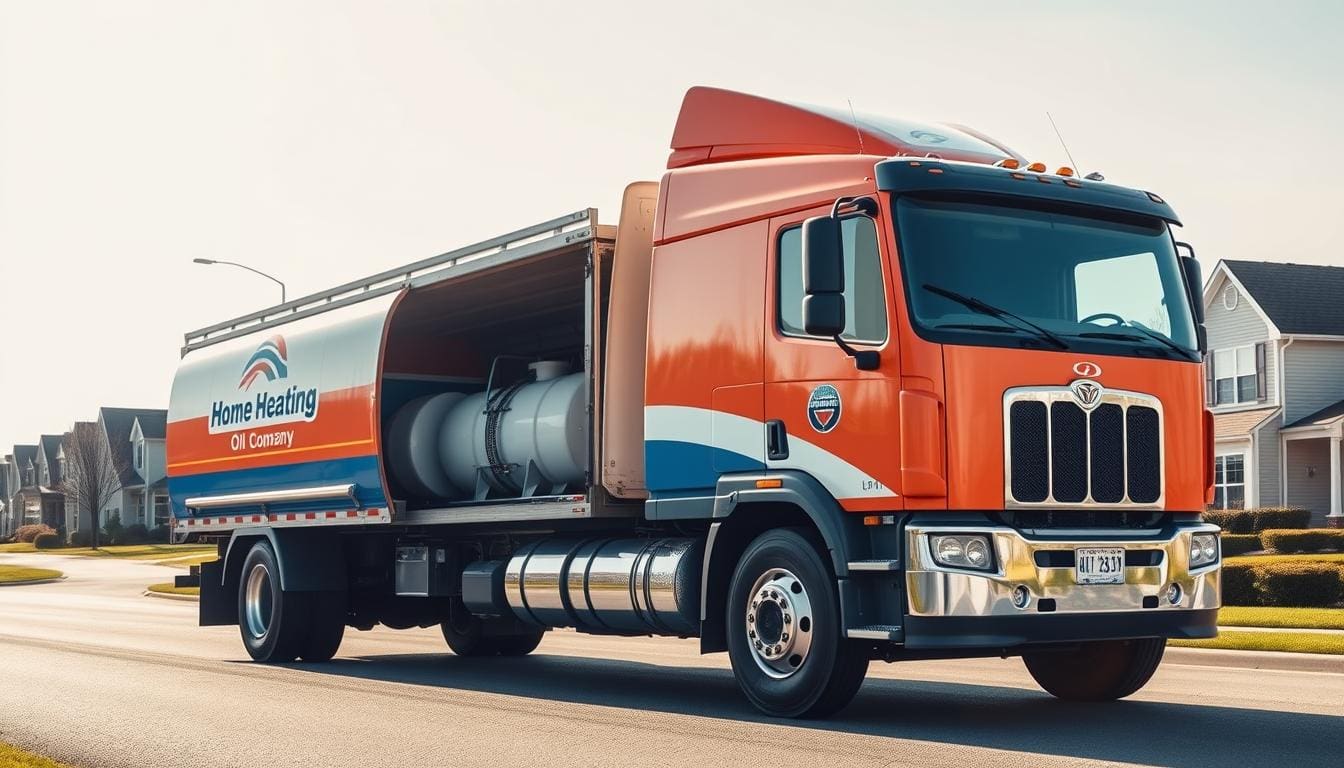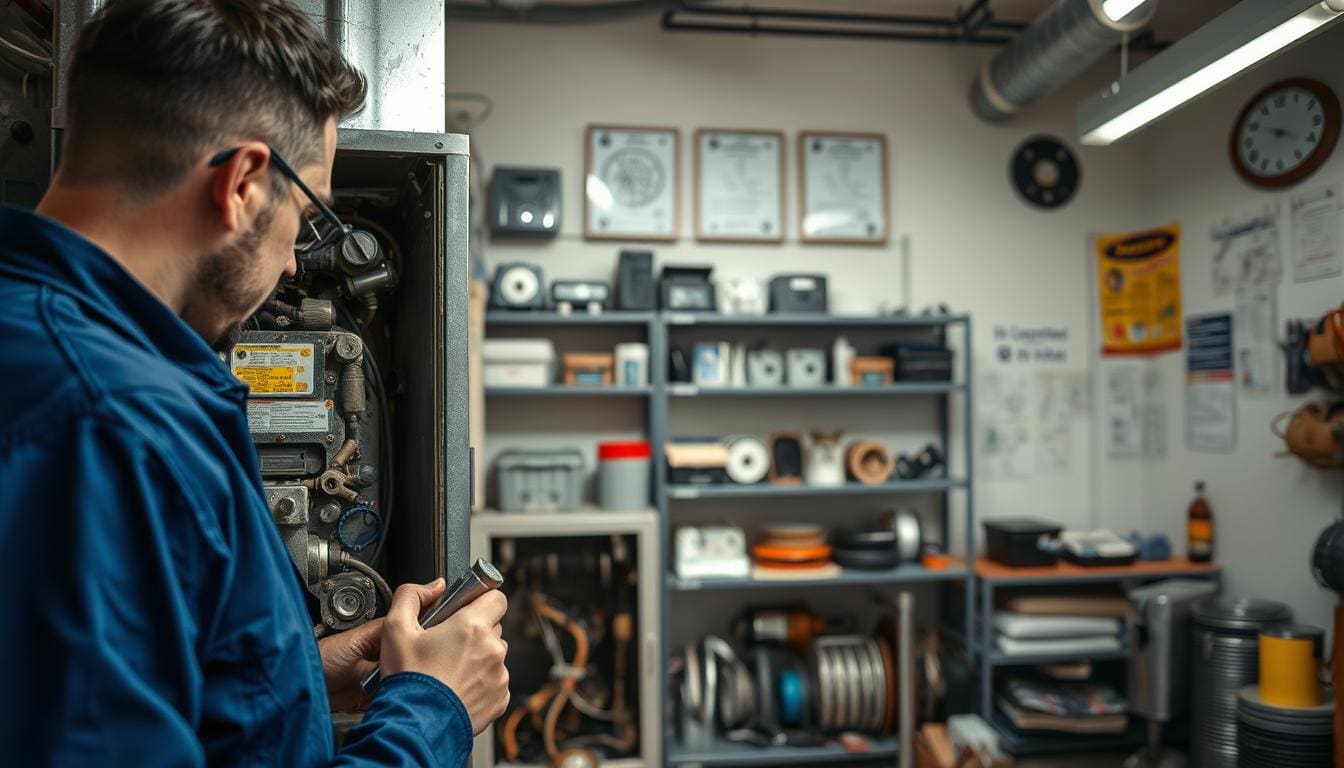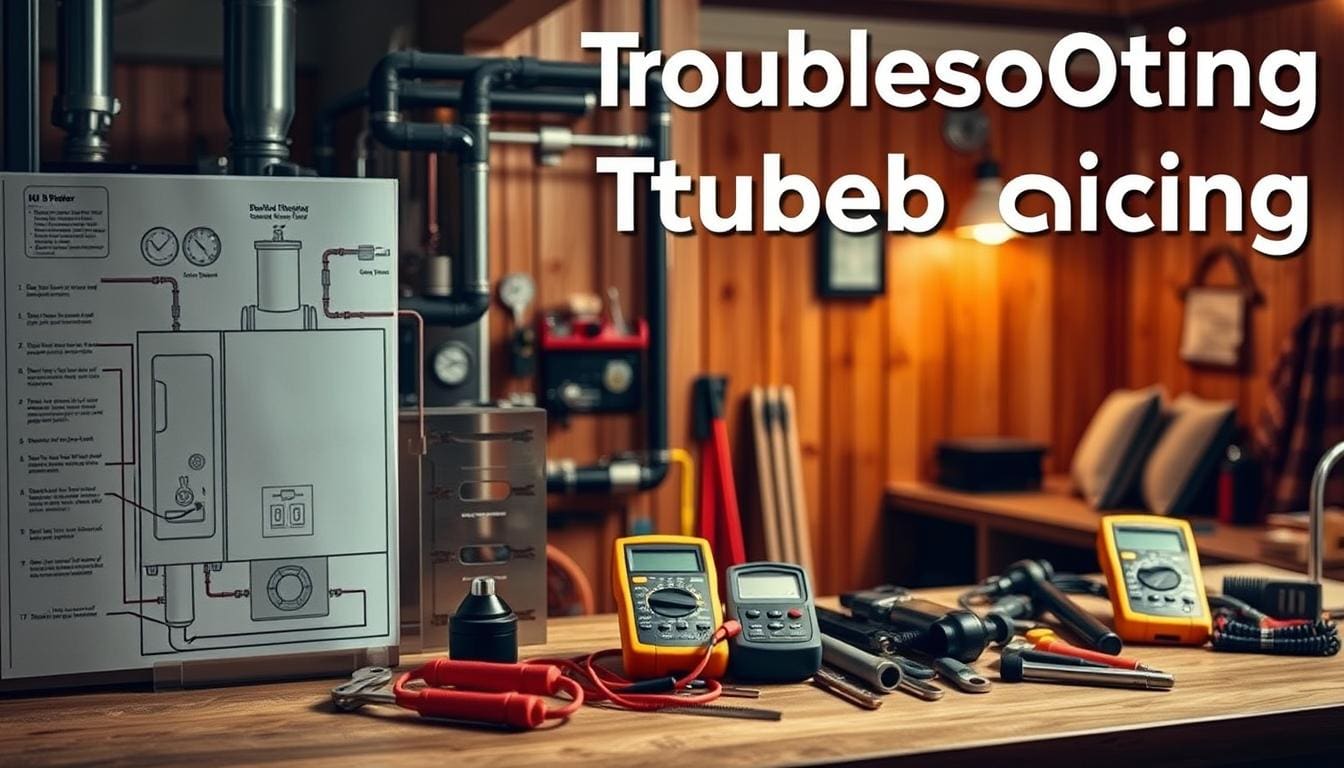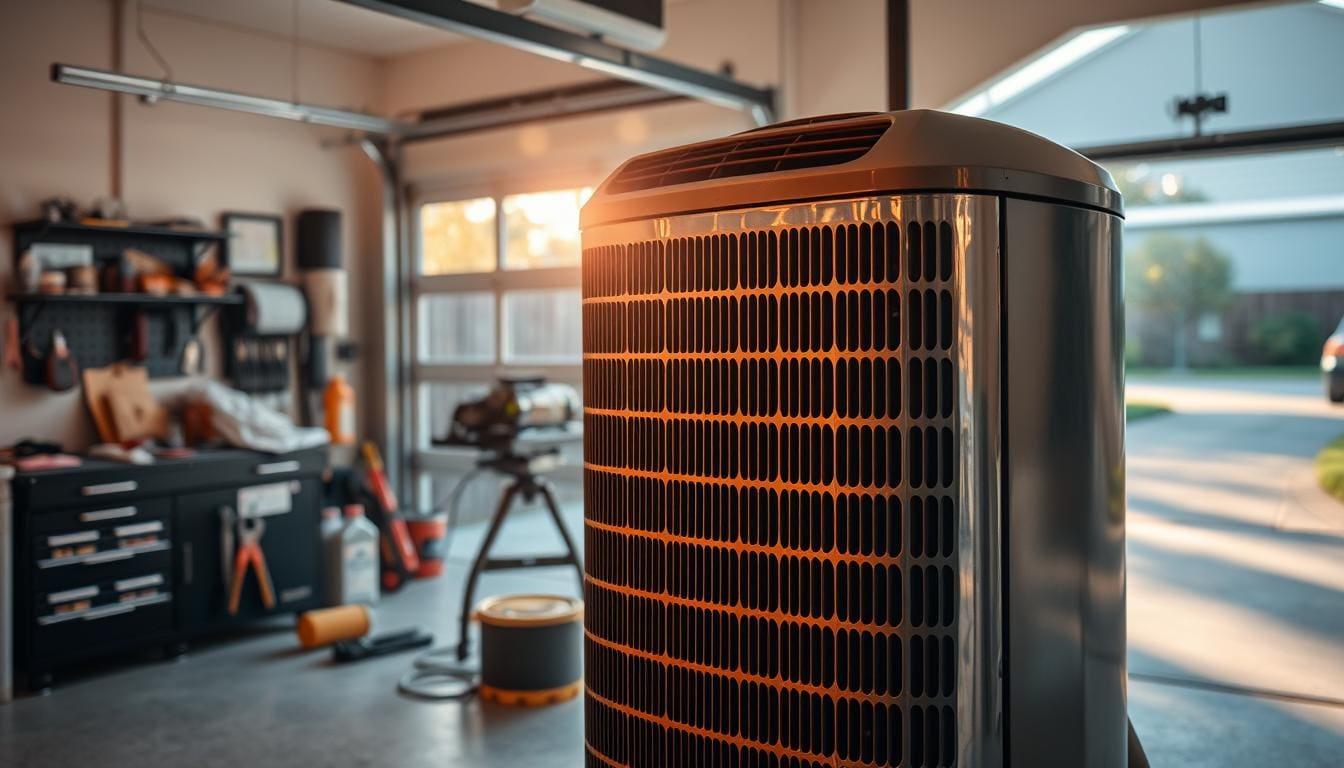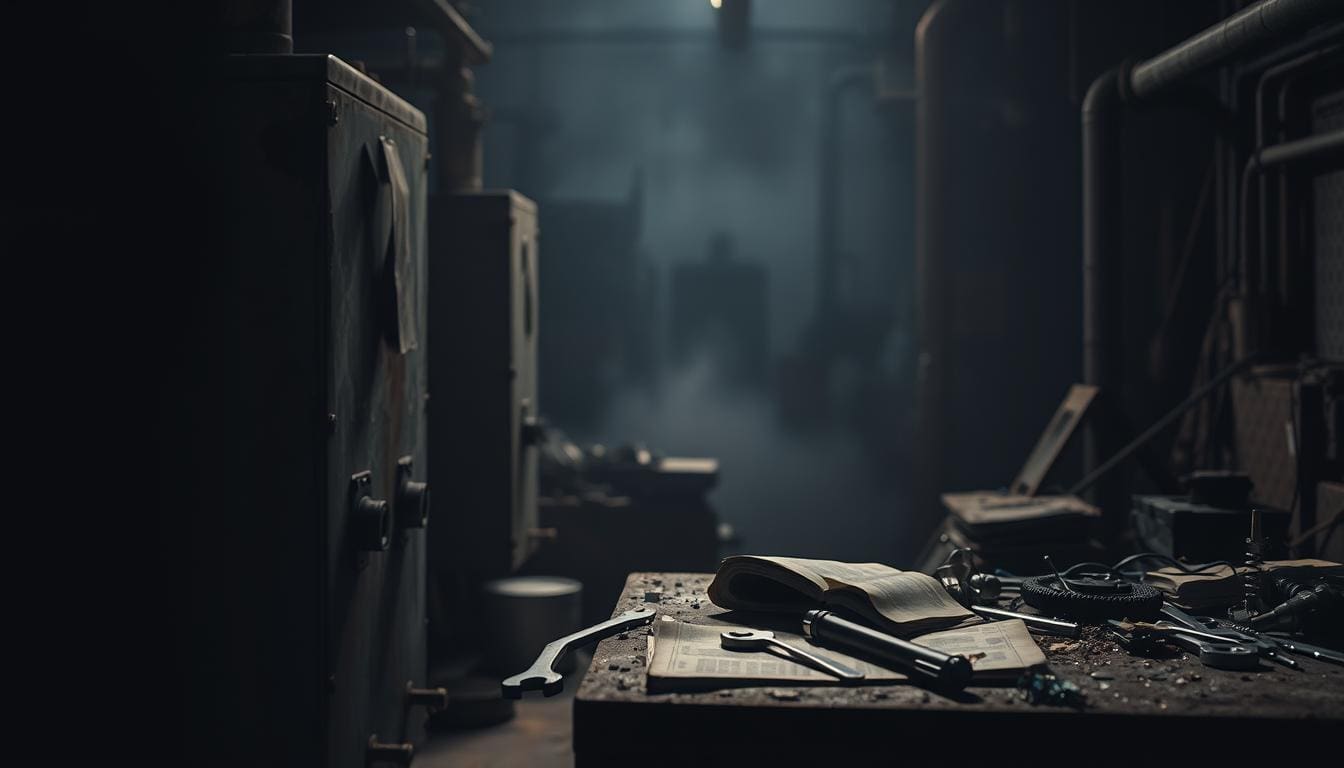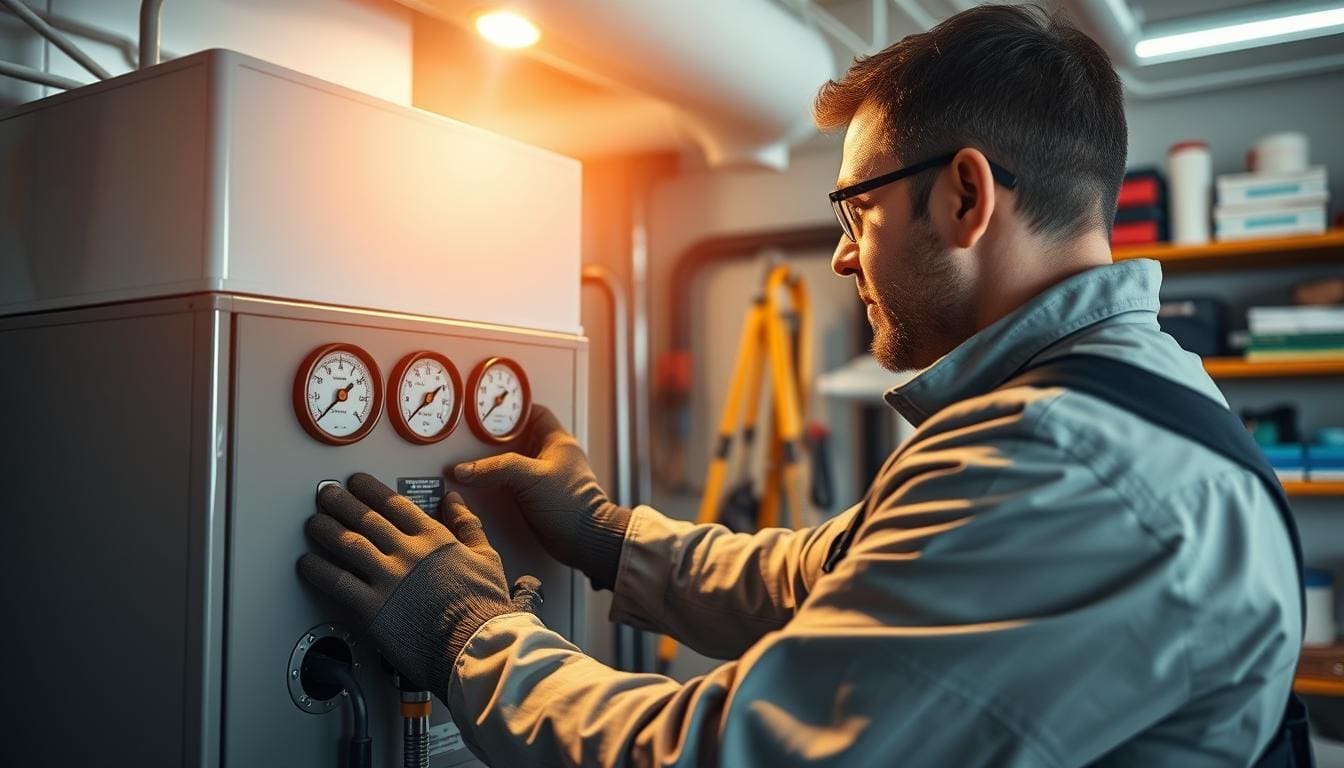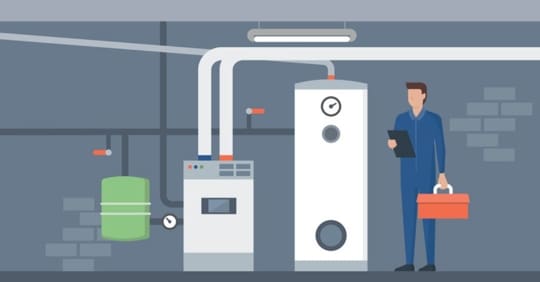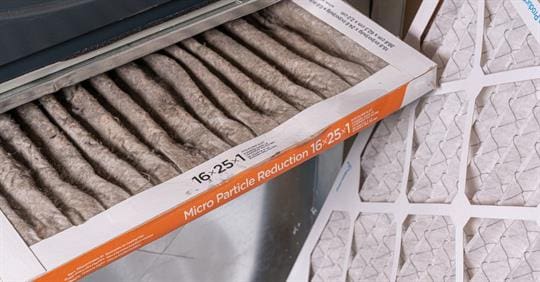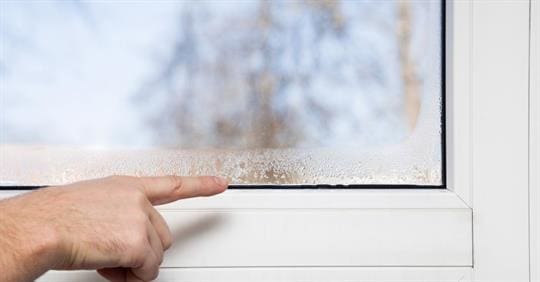Did you know that 78% of heating equipment failures happen in the coldest months? This is when you need warmth the most. It shows why spotting early warning signs is key for homeowners.
Modern families rely on good heating to stay cozy all year. If your heating starts acting up, quick help from experts can stop small problems from getting big and costly.
Heating issues never come at the best times. Spotting these signs early can save a lot of money and prevent damage. Our skilled HVAC team can find and fix problems fast.
We’ve been serving Rhode Island homeowners for over 125 years. We’re here 24/7 for emergencies. Knowing the warning signs helps you get help fast, avoiding big problems in winter.
Key Takeaways
- Spotting heating problems early saves money on repairs
- Getting a pro to check it out is cheaper than replacing it
- Our 24/7 service means help is always available
- Our experienced team offers reliable fixes
- Knowing the signs keeps your family safe and comfortable
- Quick action can make your heating last longer
Understanding Your Boiler’s Warning Signals
It’s key to know your boiler’s warning signs to keep your heating system safe and working well. These systems use water, gas, electricity, and mechanical parts. Each part can show problems in different ways.
Professional boiler technicians say catching warning signs early saves money. It also keeps your home safe. Learning what’s normal for your boiler helps you spot issues fast.
Homeowners learn to recognize their boiler’s health signs over time. These signs show up during startup, use, and shutdown. Paying attention to these times is important.
“Knowing these warning signs helps homeowners talk better with repair techs. This leads to quicker fixes and saves money.”
Watching your boiler regularly helps you notice when something’s off. Normal sounds, looks, and how it works are your guides. If it deviates from these, it’s time to call for help.
Good boiler repair services need clear problem descriptions from you. The more you tell them, the quicker they can fix it. This teamwork saves you money and time.
We suggest keeping a record of any changes in your boiler’s behavior. Note any odd sounds, looks, or performance. This info is crucial when you need to call a professional for help.
Strange Noises Coming from Your Boiler
When your boiler makes strange sounds, it’s trying to tell you something. These sounds are like a warning sign that something might be wrong. It’s important to listen to these noises because they can point to serious problems.
Different sounds mean different things to technicians. A good boiler maintenance company can figure out what’s wrong based on the sounds. Ignoring these noises can lead to bigger problems and cost more to fix.
Banging and Clanking Sounds
Loud banging or clanking noises usually mean there’s a big problem with your heating system’s flow. This can be because of kettling, where mineral buildup blocks water flow and causes overheating. The steam buildup makes the banging sounds.
Clanking can also happen if parts inside the boiler are loose. This can include heat exchanger plates or pump parts. Getting a professional to look at it right away can stop more damage.
Boilers that turn on and off a lot can also make banging sounds. This is a sign of an efficiency problem that wastes energy and can harm the system.
Whistling and Screeching Noises
High-pitched whistling or screeching usually means there’s a problem with airflow or pressure. This can be due to blocked vents or damaged parts. The louder it gets, the worse the problem is.
Screeching sounds can also come from a bad circulation pump. At first, it might only happen sometimes, but it will get worse. Pump replacement is often needed to fix this.
“Whistling sounds from boilers almost always indicate component failure or system imbalance that requires immediate professional evaluation.”
Gurgling and Bubbling Sounds
Gurgling or bubbling noises mean there’s air trapped in your system. This air stops water from flowing right and makes your heating less efficient. These sounds get louder when the boiler starts or stops.
Low water levels can also cause gurgling sounds. Pumps have a hard time moving water when there’s not enough. This can damage expensive parts. It’s a good idea to check the water pressure often.
Problems with the circulation pump can also make bubbling sounds. A boiler maintenance company can check it out and decide if it needs fixing or replacing.
Inconsistent Heating Throughout Your Home
Uneven heat in your home shows your boiler isn’t working right. This makes your home uncomfortable and wastes energy. It also means your system has to work too hard.
Try to note when and where your home gets too hot or cold. This info helps local boiler technicians find and fix the problem.
Cold Spots in Different Rooms
Cold spots happen when your boiler can’t heat water evenly. They often show up in rooms far from the boiler or on upper floors.
Air in your radiators stops hot water from flowing. Bleeding your radiators might help a little. But if cold spots keep coming back, you need a pro to look at it.
See if cold spots always happen in the same places. This helps local boiler technicians figure out if it’s a design problem, pump issue, or blockage.
Fluctuating Temperature Controls
Thermostats that change temperature a lot are broken or have system pressure problems. This makes your home uncomfortable and wastes energy.
Bad zone valves can also cause temperature changes. If these valves get stuck, your boiler can’t keep temperatures steady.
Check your thermostat at different times. If it changes temperature a lot, you need a pro to check it out. Local boiler technicians know how to handle your area’s climate.
Radiators Not Heating Properly
Radiators that don’t heat up or heat unevenly have circulation or blockage problems. Mineral deposits from hard water can block hot water flow.
Partially heated radiators mean you have sludge buildup. This is common in areas with hard water that leaves deposits in your system.
Feel each radiator from top to bottom while it’s heating. Cold spots at the bottom mean sediment, while cold tops mean air pockets. These need different fixes.
| Heating Problem | Likely Cause | Professional Solution | Homeowner Action |
|---|---|---|---|
| Cold upper floors | Circulation pump failure | Pump replacement | Document temperature differences |
| Radiator cold spots | Mineral deposits | System flush and cleaning | Check water hardness levels |
| Temperature swings | Thermostat malfunction | Control system repair | Test different temperature settings |
| Uneven room heating | Air in system | Professional bleeding and balancing | Attempt radiator bleeding |
Knowing about these heating problems helps you talk to local boiler technicians better. They know how to fix your system to heat your home evenly and efficiently.
Visible Water Leaks and Moisture Issues
Visible water leaks and moisture problems around boiler systems are big threats. They can damage both your equipment and property. It’s important to treat these issues as urgent repair situations.
Water damage around your boiler can cause many problems. It can quickly damage your property through flooring and walls. Also, it can make your system’s parts wear out faster and increase safety hazards.
Puddles Around the Boiler Base
Water pooling near your boiler base means you need help fast. These puddles usually mean failed seals, loose connections, or cracked parts. Never ignore standing water around your heating system.
Base leaks can come from worn gaskets, bad pipe joints, or a failed pressure relief valve. The worst leaks are from cracks in the heat exchanger.
Before calling technicians, take photos of the leaks. Turn off your boiler to avoid more damage. Use containers to catch water and protect the area.
A small leak today can turn into a big flood tomorrow. Fix water issues right away to protect your investment.
Corrosion and Rust Formation
Rust and corrosion on your boiler show it’s exposed to too much moisture. These signs often mean there’s a lot of damage inside. Metal damage shortens your system’s life and can be dangerous.
Corrosion starts on the outside, but it can also damage parts inside. If you see rust in your system’s water, it’s getting worse.
When you see a lot of corrosion, get a pro to check it out. Boiler replacement contractors can tell if you should fix it or replace it. Don’t try to fix corrosion yourself without the right skills.
| Leak Severity | Immediate Actions | Professional Response | Estimated Costs |
|---|---|---|---|
| Minor Dripping | Monitor and document | Schedule inspection | $150-$400 |
| Active Pooling | Shut off system | Emergency service call | $400-$1,200 |
| Major Flooding | Emergency shutdown | Immediate replacement | $3,000-$8,000 |
| Extensive Corrosion | System isolation | Full assessment needed | $2,000-$6,000 |
Water leaks and moisture problems need quick help from pros to avoid expensive damage. Boiler replacement contractors can figure out if you should fix or replace your system. It’s better to act fast to avoid bigger problems later.
Rising Energy Bills and Poor Efficiency
When your utility costs go up without a reason, it might mean your boiler needs help. Energy-efficient solutions can cut your bills by up to 30%. It’s important to keep an eye on your boiler’s performance.
Your boiler works harder when it’s not efficient. This means it uses more energy and costs more money. Getting a professional to check it is key if you notice problems.
Monitoring Your Monthly Costs
Start tracking your energy bills every month. Note the weather and how many people are home. This helps spot unusual patterns.
Watch for big jumps in your bills. A 20% increase is a red flag. Spotting problems early can save you money and make your boiler last longer.
Use apps or spreadsheets to track your energy use. Many utilities offer tools to compare your usage. These tools help you catch efficiency drops early.
Comparing Seasonal Usage Patterns
Look at your bills from the same months in past years. Normal changes should follow the weather. Big changes mean your boiler might not be working right.
Make a chart to compare your energy use over time. Include weather data to see if your boiler is using too much energy. This helps you see if your boiler is efficient.
Call a pro if your charts show your energy use is going up. They can find out why your boiler isn’t working well. Fixing problems early can avoid expensive repairs when it’s cold.
Pilot Light Problems and Ignition Issues
A malfunctioning pilot light can lead to big problems and safety risks. It’s important to get help right away if you notice any issues. Gas-related repairs are dangerous if you try to fix them yourself.
Experts in affordable boiler fixes have the right tools and knowledge. They follow safety rules and manufacturer guidelines. DIY fixes can lead to gas leaks and carbon monoxide poisoning.
Yellow or Orange Flame Colors
A steady blue flame means your boiler is working right. But, yellow or orange flames mean trouble. They show your boiler isn’t using gas well, which can make it less efficient and cost more.
These colors also mean there’s a risk of carbon monoxide in your home. This gas is colorless and odorless but very dangerous. It could be a sign of problems with gas pressure, air supply, or burner parts.
If you see these colors, call for help right away. Experts can find the problem and fix it for a good price. They use special tools to check gas pressure and how well the boiler is burning.
Frequent Pilot Light Outages
Recurring pilot light outages can mean several issues. Thermocouple malfunctions are a common cause. This safety device turns off gas if it doesn’t see the right flame temperature. Draft problems from bad ventilation can also cause lights to go out.
Gas supply problems are another reason for pilot light outages. Low pressure or dirty gas lines can stop the flame. These problems can get worse, making your system fail when you need it most.
Keep track of how often your pilot light goes out. This helps experts find the problem faster. Getting professional help ensures your system works right by fixing the real cause, not just covering it up.
| Pilot Light Problem | Potential Causes | Safety Risk Level | Repair Urgency |
|---|---|---|---|
| Yellow/Orange Flame | Incomplete combustion, gas pressure issues | High – Carbon monoxide risk | Immediate |
| Frequent Outages | Thermocouple failure, draft problems | Medium – System reliability | Within 24 hours |
| No Ignition | Gas supply issues, electrical problems | Low – No heat production | Same day |
| Weak Flame | Gas pressure, burner obstruction | Medium – Efficiency loss | Within 48 hours |
Getting a professional to check your ignition system is key when problems keep happening. Certified technicians know how to fix all parts of your system safely. They make sure affordable boiler fixes keep your home and family safe.
Unusual Smells and Gas Odors
Noticing strange smells around your boiler can stop big problems and keep your family safe. It’s crucial to take any odd smell seriously. Your boiler should not make strong or weird smells when it’s working right.
Different smells mean different issues with your heating system. Some smells mean you need a little maintenance. Others are serious and need quick action. Knowing these signs helps you keep your home and family safe.
Metallic and Burning Smells
Metallic smells often mean your boiler is overheating. These smells come from metal parts getting too hot or electrical connections overheating. If you smell strong metallic odors, turn off your system right away.
Burning smells are another big worry that needs quick action. These smells can mean:
- Electrical wiring problems causing parts to get too hot
- Mechanical friction from worn-out bearings or parts
- Dust or debris burning on hot surfaces
- Insulation materials getting damaged from too much heat
Never ignore burning smells from your boiler area. These smells often mean your system is about to fail or could start an electrical fire. Call professional technicians right away to find and fix the problem.
Any burning smell from a boiler system needs quick professional help. It often means there’s a risk of fires or equipment failure.
Gas Leak Detection and Safety
Gas smells are the most serious warning sign from your boiler. Natural gas companies add a “rotten egg” smell to help find leaks fast. This smell means you should act fast to avoid explosions or carbon monoxide poisoning.
If you smell gas near your boiler, follow these important steps:
- Get everyone out of the building right away
- Don’t use electrical switches, phones, or make sparks
- Call emergency services from a safe place outside
- Call your gas company’s emergency line
- Don’t go back inside until it’s safe, according to the experts
We stress that certified boiler specialists have the right tools and training for safe gas leak detection. They use special detectors and follow strict safety rules. Their skills help find and fix leaks safely.
Carbon monoxide is another invisible danger from gas appliances. This odorless gas can build up if boilers don’t work right or venting is bad. Experts check for carbon monoxide levels and inspect ventilation to stop this silent danger.
Regular safety checks by certified boiler specialists can find gas leak risks early. They check gas connections, test safety valves, and make sure ventilation is right. This keeps your system safe all heating season.
Age-Related Performance Decline
Every boiler system has a lifespan where age-related issues become more common and expensive. Recognizing these changes early helps homeowners decide between repairs and replacement. Experienced residential boiler experts can spot these patterns.
Boilers naturally lose performance over time due to wear and tear. Scale buildup, gasket deterioration, and increased friction in moving parts affect efficiency and reliability.
Expected Boiler Lifespan
Different boiler types have different lifespans. Cast iron boilers last longer than steel ones. Condensing models are more efficient but need more maintenance.
Water quality greatly affects boiler lifespan. Hard water causes scale and corrosion. Regular maintenance extends system life by preventing major damage.
| Boiler Type | Expected Lifespan | Maintenance Frequency | Common Issues |
|---|---|---|---|
| Cast Iron | 20-30 years | Annual | Scale buildup, section leaks |
| Steel Fire Tube | 15-20 years | Bi-annual | Tube corrosion, gasket failure |
| Condensing | 15-25 years | Annual | Heat exchanger fouling, controls |
| Combination | 12-18 years | Annual | Heat exchanger, diverter valve |
Signs of Wear and Tear
Aging boilers show specific symptoms of declining performance. We recommend watching for these signs to plan for replacement:
- Increased repair frequency – Multiple service calls per year
- Difficulty finding parts – Discontinued components become expensive
- Rising energy costs despite stable usage patterns
- Longer heating cycles to reach desired temperatures
- Visible corrosion on external components
Residential boiler experts look at these signs together. A single symptom might need a simple repair, but multiple issues suggest aging. We help homeowners decide when repairs are worth it versus replacement.
Professional assessment becomes crucial after fifteen years of operation. Annual inspections catch problems early. This approach saves money and prevents heating failures in cold weather.
Pressure Gauge and System Pressure Issues
Your boiler’s pressure gauge is key to checking system health and safety. It’s important to check it often to spot issues early. This ensures your heating system works well and safely.
Normal boiler pressure is between 12 and 15 PSI when it’s cold. It can go up to 18-20 PSI when it’s hot. Any readings outside this range mean you need to get help from a pro.
Both home and business boiler services need to understand pressure well. Experts use special tools to find and fix pressure problems. They can find the main cause and fix it right.
Low Pressure Indicators
Low pressure, below 12 PSI, can mean several issues. Water leaks are a big reason for low pressure. These leaks can happen in pipes, radiators, or the boiler itself.
Expansion tank failures also lead to low pressure. This tank helps handle pressure changes as water heats and cools. A bad expansion tank can’t keep the right pressure, causing pressure drops.
Circulation pump problems also affect pressure. If pumps don’t move water well, pressure can be off. Low pressure can make heating less efficient and even shut down the system.
High Pressure Warning Signs
High pressure, above 20 PSI, is dangerous and needs quick action. Too much pressure can damage parts and is unsafe. The pressure relief valve might turn on to prevent big problems.
Having too much water in the system can also cause high pressure. Problems with temperature control can make pressure go up when it gets too hot.
Blocked vents and closed valves can also cause high pressure. Getting a pro is key when pressure is too high. Commercial boiler services check and adjust pressure systems.
| Pressure Range | System Status | Required Action | Potential Causes |
|---|---|---|---|
| Below 12 PSI | Low Pressure | Professional inspection needed | Water leaks, expansion tank failure |
| 12-15 PSI (Cold) | Normal Operation | Regular monitoring | Proper system function |
| 18-20 PSI (Hot) | Normal Operation | Continue monitoring | Normal thermal expansion |
| Above 20 PSI | High Pressure | Immediate professional service | Overfilled system, blocked vents |
Homeowners should not try to fix pressure problems themselves. Only experts have the right tools and knowledge to fix these issues safely. Call a qualified service provider right away if you see unusual pressure readings.
Finding Reliable Boiler System Repair Near Me
Looking for boiler system repair near me means knowing when it’s urgent. Boilers break down at the worst times. Having a trusted local service ready saves time and money.
Professional repair services vary in what they can do and how fast. Look up local companies’ certifications, reviews, and guarantees before you need them. This way, you can act fast when repairs are urgent.
Emergency Situations Requiring Immediate Attention
Some boiler problems need quick help to keep you and your home safe. Gas leaks are the most urgent, needing immediate action. Always call emergency services first, then a certified repair technician.
Carbon monoxide detection is another emergency. Modern boilers have safety features. But, faulty ventilation or damaged heat exchangers can be deadly and need quick professional help.
When it gets too cold and your heating fails, it’s an emergency. Frozen pipes and damage can happen fast. Emergency boiler system repair near me searches are urgent when it’s freezing inside.
Routine Maintenance vs. Urgent Repairs
Knowing the difference between regular maintenance and urgent repairs helps with budgeting. Regular maintenance, like annual checks and tune-ups, prevents big problems.
Urgent repairs fix immediate issues like leaks or performance drops. We know which problems need quick fixes and which can wait.
“Regular maintenance prevents 85% of emergency boiler repairs, saving homeowners thousands in unexpected costs and system damage.”
Preventive care makes your equipment last longer and keeps warranties valid. Emergency repairs cost more because of after-hours rates and rush orders. Smart homeowners choose maintenance to avoid these costs.
Choosing Certified Local Technicians
Choosing the right boiler system repair near me means checking credentials and reputation. Make sure the service provider is licensed, insured, and certified for your boiler brand.
Companies with years of local experience offer better service. Dupuis Energy has over 125 years of heating experience in Rhode Island, with 24/7 emergency service and certified techs.
Local techs know local codes and climate needs. They have the right parts and understand seasonal maintenance. Response time is key in emergencies, making local services the best choice.
Preventive Maintenance Tips for Homeowners
Homeowners can prevent big boiler problems with simple steps. Regular checks help spot issues early, leading to affordable boiler fixes. This way, you avoid expensive repairs.
Keeping your boiler in good shape can make it last longer. Regular checks and care tasks are key. They also boost energy efficiency and keep warranties valid.
Monthly Inspection Checklist
Do a monthly boiler check to catch problems early. These quick checks can save a lot of money.
Essential monthly inspection tasks include:
- Check for water leaks around the boiler base and connections
- Listen for unusual sounds during operation cycles
- Examine the pilot light flame color and stability
- Record pressure gauge readings in a maintenance log
- Inspect visible pipes for signs of corrosion or damage
- Test thermostat responsiveness and accuracy
Keep a maintenance log of your findings. This helps techs fix issues faster. Many affordable boiler fixes come from catching problems early.
Watch for any changes in how your system works. Small changes can mean big problems.
Seasonal Preparation Steps
Seasonal maintenance keeps your boiler running well when you need it most. Do these tasks before and after heating season.
Fall preparation activities:
- Bleed radiators to remove trapped air
- Clean or replace air filters
- Test heating zones and controls
- Schedule professional tune-up service
- Check and clear exterior vents
Spring maintenance is about shutting down and preserving your system. Make sure to turn it off right and drain outdoor parts if needed.
Professional tune-ups can find and fix issues before they get worse. These services are cheaper than emergency repairs and prevent big problems.
Regular seasonal maintenance lowers the chance of system failures. Create a maintenance schedule to make it a habit. This keeps your heating system reliable and protects your investment.
Conclusion
Knowing the warning signs helps us protect our families and homes. Unusual noises, heating issues, water leaks, and high energy bills are red flags. Quick action can stop small problems from becoming big emergencies.
It’s crucial to call in the experts. Certified boiler specialists have the skills and tools to find and fix problems. They know how to handle complex systems safely, keeping our homes safe.
Trying to fix things ourselves might seem cheap, but it can lead to more harm. Gas leaks, carbon monoxide poisoning, and damage to the system are risks. Professional help offers reliable fixes and peace of mind.
Regular checks and maintenance are key. We should check our systems every month and get them ready for each season. If we see warning signs, we should call a qualified technician right away.
Fixing our boilers quickly keeps them running well and our homes valuable. Professional repairs mean safe, efficient, and reliable heat during the cold months. Our families need the comfort and safety of working heating systems.
FAQ
What are the most common warning signs that my boiler needs repair?
How do I find reliable boiler system repair near me?
What should I do if I smell gas near my boiler?
How often should I schedule professional boiler maintenance?
What causes my boiler to make banging and clanking noises?
When should I consider boiler replacement instead of repairs?
Why are some rooms in my house colder than others?
What does it mean when my boiler’s pilot light is yellow or orange?
How can I tell if my boiler is operating efficiently?
What should I check during monthly boiler inspections?
Are there affordable boiler fixes for common problems?
What constitutes a boiler emergency requiring immediate repair?
How do I know if my boiler’s water pressure is correct?
What qualifications should I look for in boiler technicians?
Call Dupuis Energy now at (401) 262-8006 or send us a message online.


